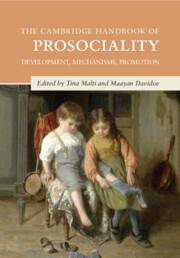Book contents
- The Cambridge Handbook of Prosociality
- Cambridge Handbooks in Psychology
- The Cambridge Handbook of Prosociality
- Copyright page
- Dedication
- Contents
- Figures
- Contributors
- Part I Development of Prosociality
- Part II Antecedents and Mechanisms of Prosociality
- Part III Development of Prosociality in Context
- Part IV Applications
- 26 Fostering Prosociality in the Family Context
- 27 Prosociality and Civic Engagement
- 28 Prosocial Behavior, Positive Youth Development, and Character Virtues
- 29 Relational Practices of Care to Nurture Prosociality and Advance Policy
- 30 Toward a New Era of Prosociality Research
- Afterword
- Index
- References
Afterword
A Reminiscence on Origins of Prosociality and Antisociality
from Part IV - Applications
Published online by Cambridge University Press: 25 May 2023
- The Cambridge Handbook of Prosociality
- Cambridge Handbooks in Psychology
- The Cambridge Handbook of Prosociality
- Copyright page
- Dedication
- Contents
- Figures
- Contributors
- Part I Development of Prosociality
- Part II Antecedents and Mechanisms of Prosociality
- Part III Development of Prosociality in Context
- Part IV Applications
- 26 Fostering Prosociality in the Family Context
- 27 Prosociality and Civic Engagement
- 28 Prosocial Behavior, Positive Youth Development, and Character Virtues
- 29 Relational Practices of Care to Nurture Prosociality and Advance Policy
- 30 Toward a New Era of Prosociality Research
- Afterword
- Index
- References
Summary
Research on prosociality through the lens of developmental psychology and related disciplines is recent in human history, starting just over 50 years ago when I began my career. It sounds like a long time, but it was not, when considered in terms of human evolution. It was exciting to get in on the ground floor. This transition to theory testing, data collection, combinations of methods, and interdisciplinary work created a niche for me to study the development of empathy and prosocial behavior. It also allowed for the study of several other aspects of prosociality that are well reflected in this volume. Malti and Davidov have created a remarkable, scholarly volume that testifies to all we have learned in a short period of time. Early students are now masters of their own innovative work with their own colleagues and students. As an epilogue to the volume, I share here with the reader some of my recollections, insights, and reflections on this body of knowledge and work that is so close to my heart.
- Type
- Chapter
- Information
- The Cambridge Handbook of ProsocialityDevelopment, Mechanisms, Promotion, pp. 614 - 630Publisher: Cambridge University PressPrint publication year: 2023

